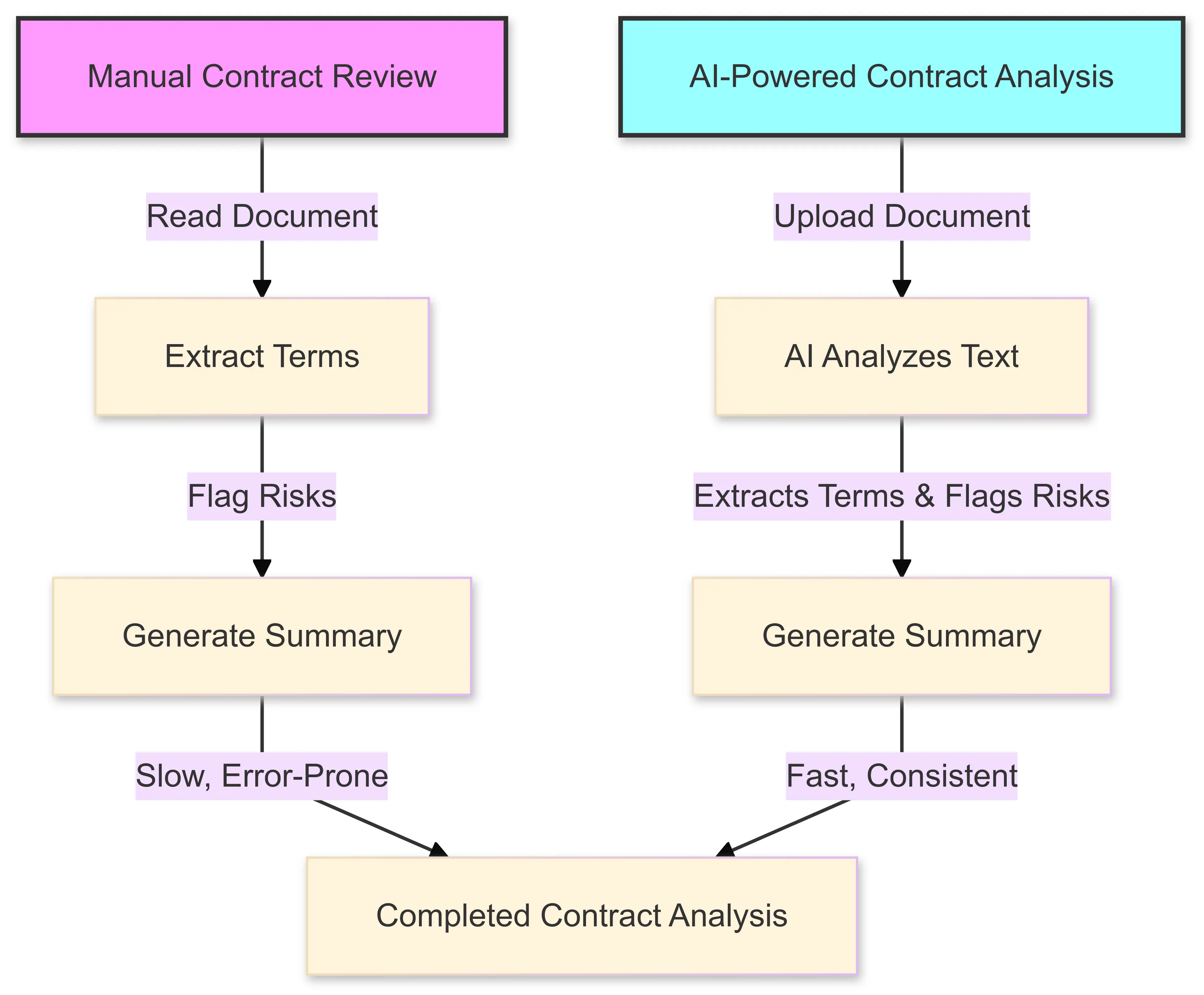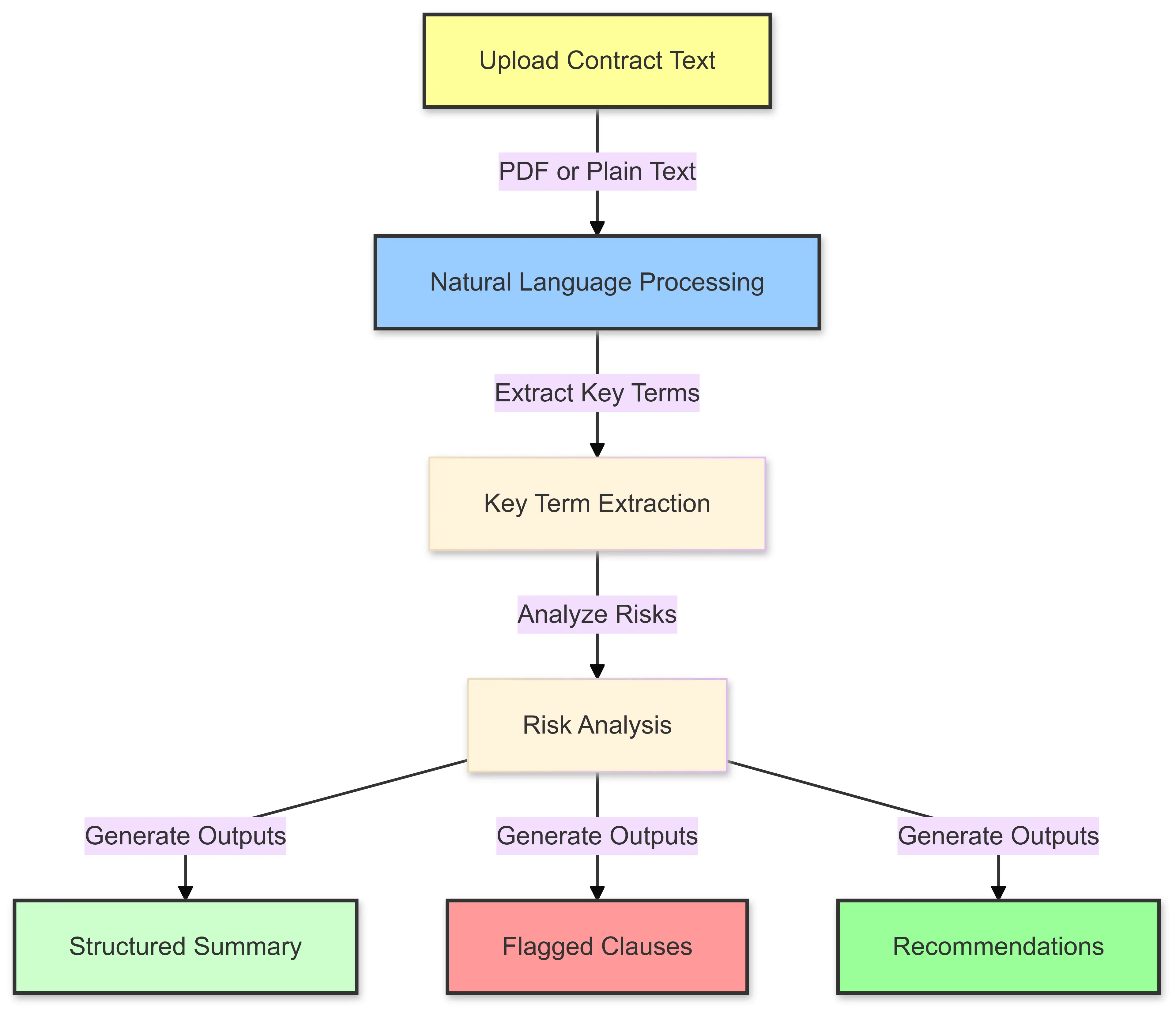ChatGPT Simplifies Contract Analysis
Monday November 18, 2024



The average corporate contract is 30–40 pages long, filled with dense legalese that can bog down even the most experienced legal teams. Reviewing a single contract can take hours, while managing dozens–or even hundreds–of contracts at scale can create bottlenecks that delay decisions and increase risks. For organizations dealing with increasingly complex contract portfolios, traditional manual review processes are struggling to keep up.
This is where ChatGPT, an advanced AI language model, is transforming contract analysis. By quickly processing large volumes of text and identifying key terms and clauses, ChatGPT offers faster, more consistent contract analysis while freeing up time for legal and contract management professionals to focus on strategic decision-making.
In this post, we’ll explore how ChatGPT works as a contract analysis tool, its benefits, and its limitations. Whether you’re looking to streamline routine contract reviews, flag potential risks, or scale your team’s capabilities, ChatGPT offers a powerful assistant to help manage the growing complexity of modern contracts.

Contracts are fundamental to business operations, but analyzing them is no small task. Each document is dense with legal terminology, and even seemingly standard contracts can contain nuanced clauses that require careful scrutiny. For legal teams and contract managers, this means spending hours or days poring over documents to identify key terms, ensure compliance, and assess risks.
The challenges don’t stop there. Manual contract review is inherently prone to oversight. It’s easy to miss a critical indemnity clause, a non-standard payment term, or a jurisdictional anomaly–each of which can expose the organization to unexpected liabilities. As the volume of contracts grows, so does the likelihood of errors, delays, and inconsistencies in analysis.
Scaling this process across hundreds of contracts is even more daunting. Organizations often find their legal teams stretched thin, creating bottlenecks that slow deal-making and compliance efforts. In short, the manual review process is time-intensive, error-prone, and increasingly unsustainable in today’s fast-paced business environment.
Addressing these challenges is where tools like ChatGPT come into play, offering the potential to speed up the process, improve consistency, and free up resources for higher-value tasks.
ChatGPT leverages advanced natural language processing (NLP) to transform the way contracts are analyzed. By understanding the structure and language of contracts, ChatGPT can extract critical information, identify patterns, and flag risks with remarkable accuracy. For instance, it can locate confidentiality clauses, governing law terms, or renewal conditions buried in dense legal text, saving hours of manual work.
One of ChatGPT’s standout features is its flexibility with input and output formats. Whether working with plain text, scanned PDFs, or digital documents, ChatGPT can process unstructured inputs and deliver structured, actionable outputs. This might include clause summaries, flagged high-risk terms, or even categorized lists of obligations and deliverables. This flexibility allows teams to streamline analysis without requiring major changes to their existing workflows.

Seamless integration into workflows is another significant advantage. ChatGPT can be used to analyze incoming contracts attached to emails, assist with bulk reviews for contract repositories, or work alongside contract lifecycle management (CLM) systems. Imagine a scenario where every incoming contract is automatically reviewed, with potential red flags highlighted for human oversight. This capability not only speeds up the review process but also ensures a consistent standard across all contracts.
By automating routine analysis and enabling smarter workflows, ChatGPT empowers contract managers and legal teams to focus on higher-value activities, such as strategic decision-making and complex negotiations.
Imagine a procurement manager tasked with reviewing a vendor contract for a new supply agreement. The document is 25 pages long, dense with legal terms, and includes several non-standard clauses. Traditionally, this would require hours of careful reading and comparison against company policy. With ChatGPT, the process becomes much faster and more efficient.
The manager uploads the contract into a ChatGPT-powered tool, which analyzes the text in seconds. ChatGPT identifies a liability clause that deviates from the company’s standard terms, flagging it as a potential risk. It also highlights an ambiguous termination clause and suggests rewording it for clarity. Alongside these red flags, ChatGPT generates a concise summary of the contract’s key terms, including governing law, payment terms, and renewal conditions.
Expected outputs from this review include:
This workflow allows the procurement manager to focus on high-priority issues instead of spending hours on routine analysis. By providing actionable insights, ChatGPT helps ensure contracts are reviewed thoroughly and efficiently, reducing the likelihood of missed risks or costly oversights.
ChatGPT brings transformative benefits to contract analysis, addressing some of the most persistent challenges faced by legal teams and contract managers.
One of ChatGPT’s greatest strengths is its ability to drastically reduce the time spent on routine analysis. Tasks like identifying renewal dates, flagging non-standard clauses, or summarizing contract terms can now be completed in minutes instead of hours. For example, instead of manually reviewing a 40-page vendor agreement, ChatGPT processes the document and generates a detailed report in seconds, freeing up legal teams to focus on strategic negotiations or higher-value activities.
Manual contract reviews often vary depending on the reviewer’s experience and attention to detail. ChatGPT eliminates this variability by applying uniform standards across all analyses. Whether it’s a confidentiality clause or an indemnity term, ChatGPT ensures the same level of scrutiny every time, reducing the risk of oversights or inconsistencies.
For organizations managing hundreds or even thousands of contracts, scaling manual reviews is a logistical nightmare. ChatGPT solves this by enabling parallel analysis of multiple documents. Legal teams can process high volumes of contracts simultaneously without compromising accuracy, making it an invaluable tool for fast-growing businesses or those operating across multiple jurisdictions.
By combining speed, consistency, and scalability, ChatGPT empowers organizations to handle complex contract portfolios more effectively while mitigating risks and improving operational efficiency.
While ChatGPT offers significant advantages in contract analysis, it is not without limitations. Understanding these challenges is essential to integrating it effectively into workflows.
ChatGPT excels at identifying patterns and extracting information, but it may struggle with poorly worded or highly ambiguous clauses. For instance, a vague non-compete clause or a convoluted liability section might require deeper contextual understanding that goes beyond what the AI can interpret. Additionally, ChatGPT relies on the quality of its training data, meaning it may occasionally misinterpret niche legal terminology or uncommon phrasing.
This is where human expertise comes into play. ChatGPT is best viewed as a first-pass tool, streamlining the initial review process and flagging areas for further scrutiny. Legal professionals can then apply their judgment to address nuanced issues, ensuring accuracy and compliance. Think of ChatGPT as a powerful assistant, not a replacement for your legal team. It handles the routine tasks, leaving your team free to focus on high-value, strategic decisions.
By combining ChatGPT’s speed and consistency with human oversight, organizations can maximize efficiency while maintaining the precision and nuance required for effective contract management.
The future of contract analysis is poised for exciting advancements, driven by emerging AI capabilities. Predictive analytics is one area of potential growth. Smarter AI models could assess risk levels in contract language by analyzing patterns from historical contract disputes or industry-specific trends. For instance, an AI might not only flag a termination clause but also predict its likelihood of causing conflict based on similar cases.
Ethical considerations will also play a crucial role as AI becomes more integral to contract management. Ensuring transparency in how AI models flag risks and generate recommendations will be essential for building trust. Fairness must also be prioritized, preventing biases in recommendations that could disadvantage certain parties or industries. Striking the right balance between automation and accountability will shape the future of AI in contract analysis.
ChatGPT is revolutionizing contract analysis by offering faster reviews, greater consistency, and scalability for managing complex contract portfolios. It enables teams to shift their focus from routine tasks to strategic decision-making, ensuring that organizations stay agile in a fast-paced business environment.
The adoption of AI tools like ChatGPT represents a significant step forward in contract management. By integrating these technologies into workflows, organizations can streamline processes, mitigate risks, and unlock new efficiencies. Now is the time to explore how AI can enhance your approach to contract analysis and position your team for long-term success.